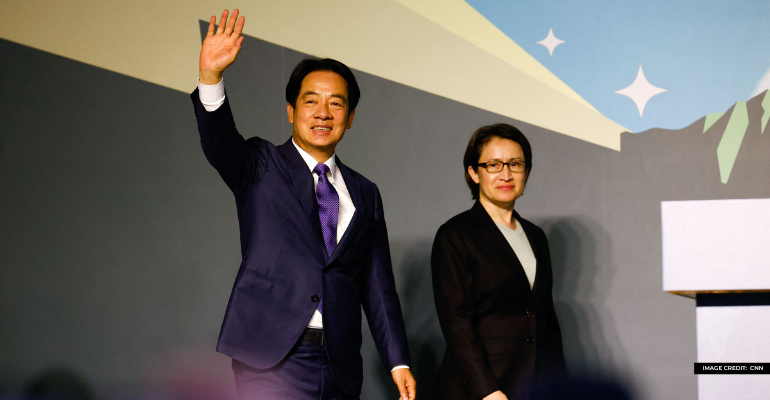Taiwan’s Vice President, representing the Democratic Progressive Party (DPP), William Lai Ching-te, won the Taiwan Presidential elections on Saturday, January 13.
“This is a night that belongs to Taiwan. We managed to keep Taiwan on the world map,” Lai told thousands of supporters at a rally after his win.
“The election has shown the world the commitment of the Taiwanese people to democracy, which I hope China can understand,” he added.
China responded soon after the vote by stating, “Taiwan is part of China.”
Following the tally of votes from all polling stations on Saturday, the Central Election Commission reported that Lai secured 40.1 percent, surpassing Hou who garnered 33.5 percent.
Hou gracefully admitted defeat and extended congratulations to Lai for his victory. Additionally, he offered an apology to KMT supporters, expressing regret for not succeeding in displacing the DPP. Ko similarly conceded defeat in the election.
“I want to thank the Taiwanese people for writing a new chapter in our democracy,” Lai said in a victory speech where he thanked his two opponents for conceding. “We are telling the international community that between democracy and authoritarianism, we will stand on the side of democracy.”
He expressed his aspiration for a resumption of exchanges with China characterized by “healthy and orderly” relations. He reiterated his commitment to engaging in discussions founded on principles of dignity and equality.
Lai’s vice-presidential candidate, Hsiao Bi-khim, who previously held the position of Taiwan’s chief representative to the United States, secured the position of Vice President through the election.
The outcome indicates voters supporting the DPP’s perspective, affirming Taiwan as a de facto sovereign nation. This stance advocates for strengthening defenses against China’s threats and enhancing ties with other democratic nations, even in the face of potential economic repercussions or military intimidation from Beijing.
It also serves as a rejection of the assertive tactics employed by Xi over the past eight years, as he has consistently emphasized the “historical inevitability” of Taiwan’s reunification with the mainland.
In response to the election outcome in Taiwan, a representative from China’s Ministry of Foreign Affairs emphasized that regardless of any shifts in Taiwan, the fundamental reality remains that there is only one China globally, and Taiwan is an integral part of China, a stance that will persist.
A press statement released on Sunday by MOFA highlighted that Taiwan received congratulations from its 12 diplomatic allies and the governments or legislatures of over 50 nations worldwide.
However, the ministry pointed out that on Saturday evening, a representative from China’s Foreign Ministry released a statement that was deemed “absurd” as it categorically labeled the election and any matters pertaining to Taiwan as an “internal affair” of China.
Lai Ching-te, who currently holds the position of vice president, competed in a three-way contest against Hou Yu-ih of the conservative Kuomintang (KMT) and former Taipei Mayor Ko Wen-je from the recently established Taiwan People’s Party (TPP), formed in 2019.
Also Read: Gabriel Attal appointed as France’s youngest and first openly gay Prime Minister

Leave a Reply